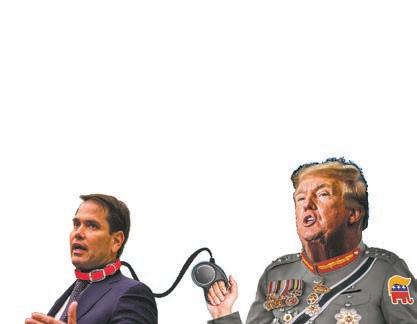
6 minute read
A&C
Clear Eyes, Blue Hearts, Can’t Lose
Old days, new days and all points between: A Q&A with the legendary Bob Mould
Advertisement
BY DAVE JORDAN author@sfreporter.com
Punk rock legend, pioneer and founder of Minnesota’s seminal Hüsker Dü, Bob Mould, heads to Santa Fe next week courtesy of AMP Concerts for solo selections culled from his long career. We caught up with Mould ahead of his show to learn about his thoughts, ethos and storied career. This interview has been edited for space and clarity.
SFR: For decades now you’ve been extremely prolific. You always seem to have something you’re pushing towards, so what is the core of your passion for creating? What really drives you to keep producing?
Bob Mould: It’s the first and foremost thing that I am good at. Music got to me as a small child, it got me through my childhood, both in the ’60s when I was a small child, and later in the ’70s through high school—and then finding punk rock. Music is my life. It saved my life. It keeps me alive. It’s the way that I think I best communicate my ideas and my stories to people. When I wake up in the morning it’s music, I’m thinking about music. On the good days, when I’m thinking about music in the morning and in a positive way, I get right to work...but not every morning is a Hoover Dam morning, you know? A lot of mornings are a, ‘What the hell did I just write? Hide that forever!’ kind of morning.
After Hüsker Dü, with Sugar and with your current band, it’s always been, “All songs written by Bob Mould.” Are there aspects of collaborative songwriting you miss? You said you have some good days and bad days—do you miss having somebody to bounce ideas off of?
From the beginning with Hüsker Dü, everybody was writing, and over time it became myself and Grant Hart being the principal songwriters. There’s a few collaborations in the body of work that might be, ‘How about I write this verse and you write that verse?’ The song ‘Flip Your Wig’ being a perfect example of that. But typically, we wrote independent of each other and then worked things out as we’re making a record. After that, it’s been pretty singular. The big exception to that would be the Blowoff artist album that came out in ’06; that was myself and Rich Morel. Blowoff was a DJ party that Rich and I hosted for 11 years from ’03 through 2014, and that album is a completely 50-50 collaboration. And that’s really the only time I’ve done full collaboration for an album.
I’ve been working with [bassist] Jason Narducy and [drummer] John Wurster since 2008, so this is the longest I’ve collaborated with other musicians ever. I’m a singular songwriter, but over the course of those 14 years Jason and John have had a lot of influence over the direction of the records merely by being part of the band. I’m writing more toward the strength of the band as a performance unit, but still keeping singular editorial over the lyrics. Do I miss the idea of collaborating 50-50 with somebody? Yeah, there have been times where I’ve thought, ‘Find some people to write songs with. Just get together with people in a room and write some songs,’ and there’s something really attractive about that. I will say, recently in pop music, it looks like it takes a number of people to write a song, and when I hear those songs I don’t hear a singular storytelling voice. But people seem to like that kind of storytelling or that kind of songwriting right now, or that seems to be what the music industry is favoring at the moment. As a singular storyteller I never really hear a story in those, like I’m not sure who’s telling the story and the artist is the vessel. I don’t know if that really works for me.
There is a certain romance to piling in a half-broken van and not knowing if you’re going to have a place to sleep or if you’re going to make gas money, but still just doing it anyway. Is there anything you miss about those early days of touring and punk rock? The reckless abandon of it?
All the things you mentioned, I don’t miss that uncertainty at my age. When I was in my late teens through my late 20s, I was pretty convinced what I was doing was right. I/ Hüsker Dü were pretty damn resourceful. We had a lot of help and support from people who were in the same situation, and we gave back as much as we were given. So in that climate, it was very easy to get in a van that you hoped was roadworthy with a map that was pretty current, with some landline numbers that were connected to a person you knew was on the other end; but you had to use a payphone. It was a whole different world. The seat of the pants thing, I think, was what made all of it so exciting. Every day was an adventure, every day was, ‘I wonder where the vegan restaurant is, because it’s probably next to the indie
JAMES RICHARD IV Bob Mould: The man. The legend. The punkest. record store or the skate shop,’ and that was the GPS of the ’80s. Yeah, it’s very romantic, and it’s definitely for when one is young and durable and righteous and indestructible. Now that I’m in my 60s? Noooo, I sort of want to know where I’m going. It’s just a reality. I can’t pretend that more years of wild adventure would be would be good for my health [laughs].
I grew up going to hardcore shows in the ’90s, when there was a lot of tough-guy posturing and machismo and slurs. You have stories in your book, See a Little Light, about similar things from the ’80s—how do you feel the music scene has changed in that regard? Do you still come up against that type of ignorance, or do you feel like you’ve really surrounded yourself with good people?
I think I’ve surrounded myself with the good people. I think there are different avenues out there, and fortunately there are progressive avenues for more progressive, accepting audiences and artists. That’s the work of the music business: booking agents, venues, promoters, publications, record labels. Everybody being mindful that we’re not all the same, but we all love music.
There’s a tolerance and an understanding and a willingness to learn about things we may not know. I think about trans youth issues. Ten years ago, maybe not so much on people’s radar, but right now it’s very important for all of us to learn why people should be encouraged to identify themselves in the way they want to be identified, for instance. Those are the kinds of things that I think younger people have asked of us. I’m guessing somewhere in the world there’s an alternate universe that is the complete opposite of everything I just said, and I bet those shows are going really well, too, but I don’t know where those shows are. I think we all gravitate to the places that we’re supposed to be, and I think that’s one of the good things the internet has afforded us. Forty years ago, with that hopefully trustworthy van and vegan restaurant next to the indie record store, that was about the best we could do, we didn’t have the instantaneous worldwide free communication and media. We are lucky to be living in this age, but the flip side of it is really frightening, too. Everything has just been made available and amplified. It’s a societal thing more than a music thing, and I’m just grateful that the playing field is more level than it used to be.
Find an extended version of this interview at sfreporter.com
BOB MOULD SOLO ELECTRIC:
7:30 pm Tuesday, Sept. 20. $35 Tumbleroot Brewery & Distillery 2797 Agua Fría St., (505) 393-5135








